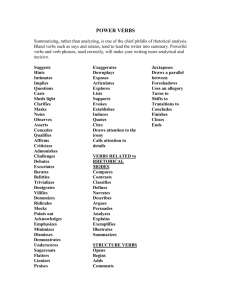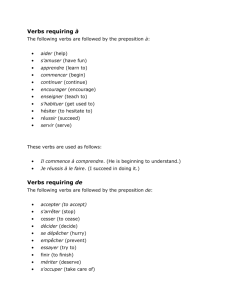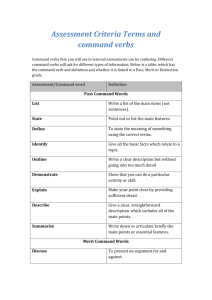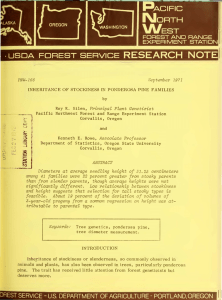Vocabulary and Grammar-Building vocabulary
advertisement
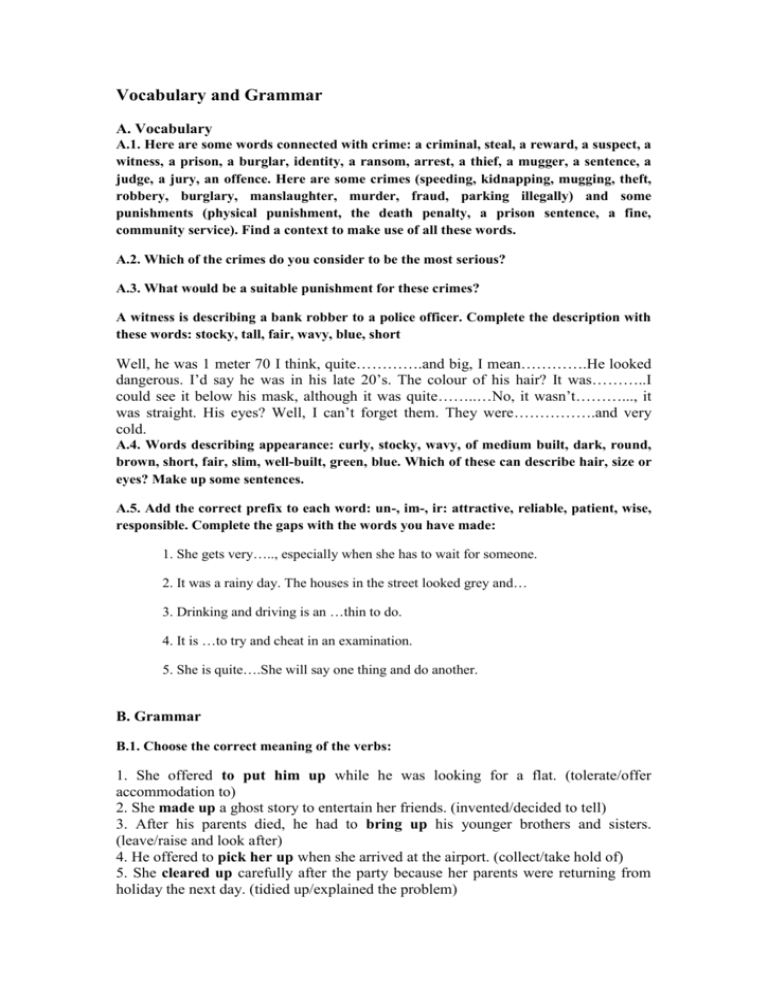
Vocabulary and Grammar A. Vocabulary A.1. Here are some words connected with crime: a criminal, steal, a reward, a suspect, a witness, a prison, a burglar, identity, a ransom, arrest, a thief, a mugger, a sentence, a judge, a jury, an offence. Here are some crimes (speeding, kidnapping, mugging, theft, robbery, burglary, manslaughter, murder, fraud, parking illegally) and some punishments (physical punishment, the death penalty, a prison sentence, a fine, community service). Find a context to make use of all these words. A.2. Which of the crimes do you consider to be the most serious? A.3. What would be a suitable punishment for these crimes? A witness is describing a bank robber to a police officer. Complete the description with these words: stocky, tall, fair, wavy, blue, short Well, he was 1 meter 70 I think, quite………….and big, I mean………….He looked dangerous. I’d say he was in his late 20’s. The colour of his hair? It was………..I could see it below his mask, although it was quite……..…No, it wasn’t………..., it was straight. His eyes? Well, I can’t forget them. They were…………….and very cold. A.4. Words describing appearance: curly, stocky, wavy, of medium built, dark, round, brown, short, fair, slim, well-built, green, blue. Which of these can describe hair, size or eyes? Make up some sentences. A.5. Add the correct prefix to each word: un-, im-, ir: attractive, reliable, patient, wise, responsible. Complete the gaps with the words you have made: 1. She gets very….., especially when she has to wait for someone. 2. It was a rainy day. The houses in the street looked grey and… 3. Drinking and driving is an …thin to do. 4. It is …to try and cheat in an examination. 5. She is quite….She will say one thing and do another. B. Grammar B.1. Choose the correct meaning of the verbs: 1. She offered to put him up while he was looking for a flat. (tolerate/offer accommodation to) 2. She made up a ghost story to entertain her friends. (invented/decided to tell) 3. After his parents died, he had to bring up his younger brothers and sisters. (leave/raise and look after) 4. He offered to pick her up when she arrived at the airport. (collect/take hold of) 5. She cleared up carefully after the party because her parents were returning from holiday the next day. (tidied up/explained the problem) 6. She put off going to university and worked abroad for a year. (delayed going/decided not to go) B.2. Complete each sentence with the correct form of one of these verbs. Make all the necessary changes: perform, apply, construct, punish, organize, appear, converse, identify 1. When the witness made a positive…, the criminal was arrested. 2. His sudden…at the party surprised everyone. Nobody expected him to come. 3. It’s difficult to have a…with him. He’s so shy. 4. The actors….had good reviews in all the national papers. 5. The…of the new bridge over the River Thames took two years. 6. She completed her university…form and sent it off. 7. The Red Cross is a charitable…which helps people around the world. 8. Many people agree that capital…should no longer exist. B.3. Match these adjectives to the prepositions and find a context: interested, embarrassed, ashamed, keen, proud, bored, good , pleased/ on, in, of, at, by, with. Discuss with a partner what makes you feel that way. Write several sentences about what your partner said. B.4. Use one of the verbs: try on, take off, give up: 1. It’s always a good idea to…clothes before buying them. 2. I don’t think he will ever be able to…smoking. 3. The plane…late because of the storm. 4. After several months of hard work, his computer company really… 5. I hate …shoes in shoe shops. They are never the right size for me. B.5. Give the single word synonym for the following phrasal verbs: 1. The camera zoom in on her beautiful eyes. (zoom out on - ) 2. He jumped into his car and zoomed off. (hurry away - ) 3. His yellow jacket stood out clearly against the hillside. (faded away- ) 4. She’s the sort of person who always stands out in a crowd. (sticks out- ) 5. I saw this play last year and it just blew me away. ( 6. I tried to fight back my tears. ( 7. I had an urge to scream but managed to fight it back. ( 8. He usually drops off in front of the television. (nod off, doze off- ) 9. He failed his exams because he was messing around instead of studying. ( 10. I wouldn’t mess with him. He has a terrible temper and can get violent. ( 11. The town is crawling with tourists at the moment. ( 12. He thinks it’s time we did away with the monarchy. ( 13. I’m very busy at the moment, so I’ll deal with that later. ( 14. In my job I have to juggle with several different things at the same time. ( 15. Please don’t meddle with things you don’t understand. ( 16. He always sides with his wife in any family arguments. ( 17. She’s under a lot of strain at the moment, just bear with her. ( 18. We had better stock up on sugar as there is going to be a shortage. ( 19. They have split up after twenty years of marriage. ( 20. Can you come back home? Something serious has come up. ( Exercises on English Vocabulary 1. Derivation. Read the words below formed by derivation and write other examples for each prefix: A- (denotes the absence of a quality): amoral, asexual ANTE- (leading to another): anteroom, antechapel ANTI- (against): antisemitic, antichrist, anti-militarist, anticlimax ARCH- arch-liar, arch-important, arch-enemy AUTO- autobiography, autosuggestion BE- befriend (help), belittle (diminish) BI- (having two): bisexual, bilingual, CO- (together): co-heir, co-existent, co-operate COUNTER- counterattack, counterpart, counter-revolution DE- decode, demobilise, dehumanise DIS- (it negatives the noun): dishonour, distrust, disobedient, disagree, disreputable, disbelieve, discourage, disconnect EN/EM (befor –b/p to form verbs from nouns): embed (encrypt), endanger, enslave, embitter, ensnare (track) EVER: evergreen, everlasting EX- (former): ex-chancellor, ex-Prime Minister EXTRA (outside) : extra-terrestrial, extra-territoria, extra-ordinary FORE: forearm, forefather (ancestor), forefinger (index), foregoing, foregone (prejudice), forehead, foresee, foresight HYPER (excessively): hyper-critical, hyper-sensitive INTER (among, between): intermarriage, internation MAL (badly): to maltreat, malpractice OVER: oversensitive, overanxious, overlook, overcome OUT: outlive, outlast, outgrow, outrun, UNDER: underestimate, undermine, understate, undershell, UP: upset, uphold 1. Word formation. There are several ways of forming words with opposite meaning: negative prefixes and suffixes (insecure, powerless), lexical devices (lack of), or words with negative meaning (deprivation). Give examples of each category. 3. The following ‘word cloud’ shows the most frequently used words in the article. Choose 10 and build a short composition.





